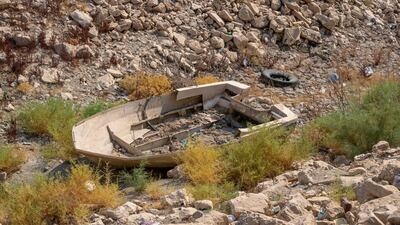The Middle East and North Africa region has topped global rankings of water-stressed regions, and every Mena nation will suffer extreme water scarcity by 2050, new research has shown.
Demand for water is already outstripping renewable supply at an alarming rate, according to research published by the World Resources Institute on Wednesday.
About 83 per cent of people in the region are living under extreme water stress, the report said, with more than 80 per cent of water supplies used for irrigation, livestock, industry and domestic needs.
The report warned that even a brief drought could wreak havoc and totally consume supplies, pushing governments to cut water to residents.
The Gulf topped the charts in the report, with Bahrain in first place.
Kuwait, Oman and Qatar all placed in the top six, alongside Lebanon and Cyprus.
“The water stress in these countries is mostly driven by low supply, paired with demand from domestic, agricultural and industrial use,” said the institute.
The UAE came in seventh in the WRI ranking, followed by Saudi Arabia, Israel, Egypt, Libya and Yemen.
South Asia is the second most stressed region, with 74 per cent of countries experiencing water stress.
Water shortages are already ruining lives across the region and have devastated lakes, rivers and farmland.
As Wednesday's research shows, poor and conflict-ravaged nations are most at risk, and have the least resources to tackle the problem.
In May, a UN official warned that Iraq will only be able to meet 15 per cent of its water needs by 2035 if trends continue.
This is exacerbated by dam projects in neighbouring Iran and Turkey, which threaten to cut off water supply to Iraq.
Water scarcity could deal a severe blow to a large proportion of its population, with almost a third of people relying on agriculture as their main source of income.
In Lebanon, Unicef has previously warned that six million people are at risk of health problems owing to water shortages.
Agriculture has already suffered, with farmers telling The National each season is like "playing the lottery".
Iran has been also noted as particularly vulnerable to climate change, which the WRI attributes to decades of mismanagement and unsustainable water use.
It has already led to protests and “tensions that will only intensify as water stress worsens”, the WRI said.
Sub-Saharan Africa will undergo the biggest changes in water demand between now and 2050, the institute said, with demand growing faster than any other place in the world.


